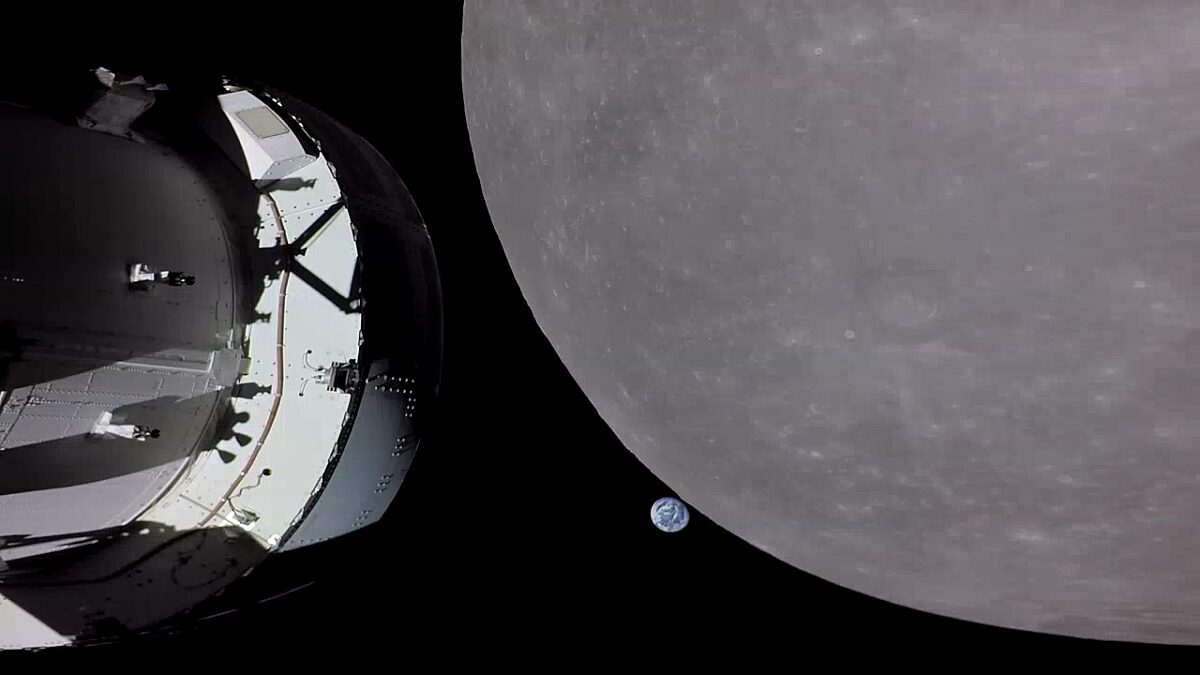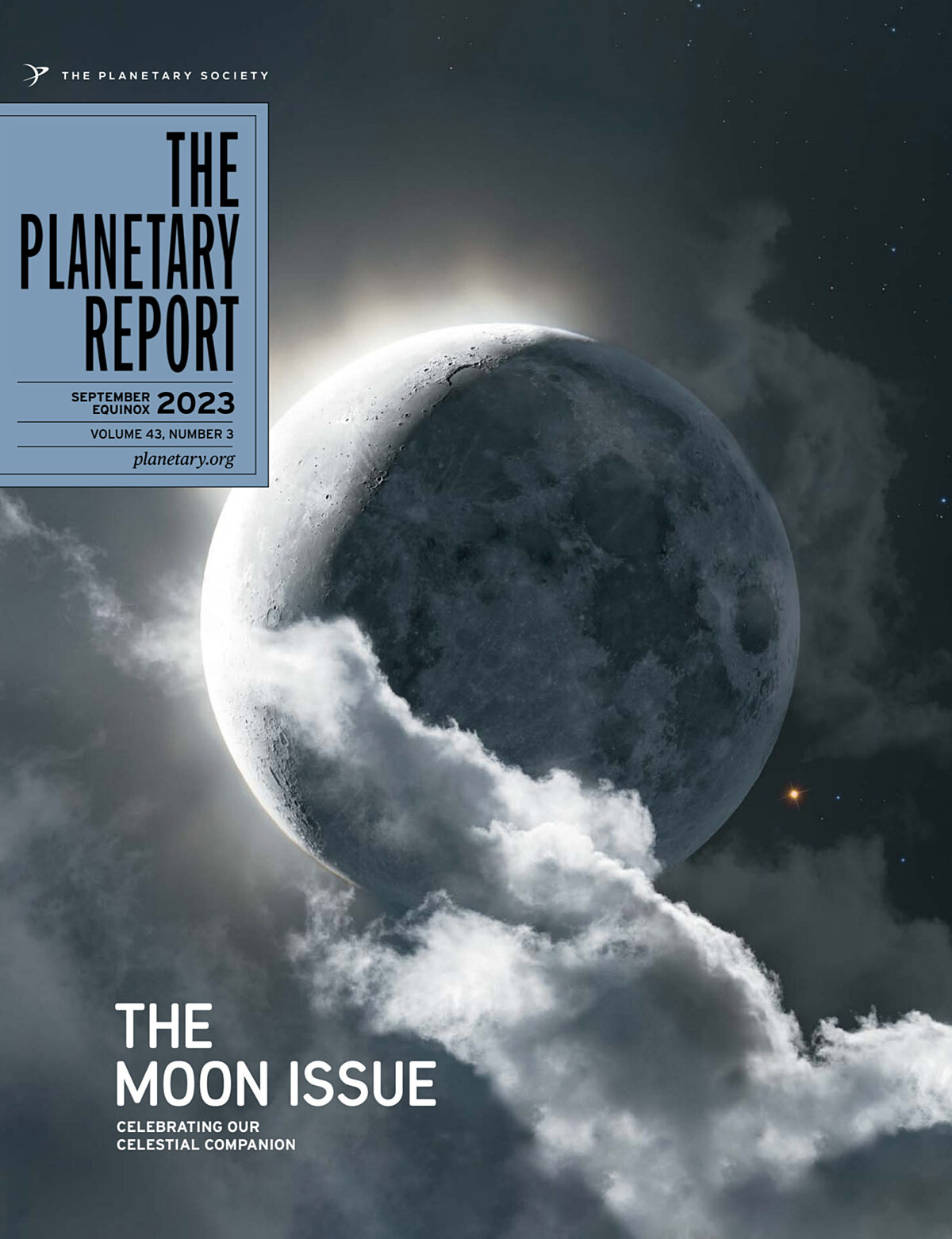To the moon together
Space exploration has taken many forms since the first satellite launched in the 1950s. Space has been the domain of fierce geopolitical competition; peaceful scientific cooperation; and more recently, commercial ambition. The U.S.-led Artemis program, which aims to return astronauts to the Moon’s surface and develop a sustainable infrastructure in lunar orbit, involves a slightly different approach: inviting countries and companies from around the world to take part in a grand collaborative effort that none could accomplish alone.
Dr. Scott Pace, director of the Space Policy Institute at the George Washington University’s Elliott School of International Affairs, has been a longtime advocate for the Moon as the ideal destination for sustainable, internationally cooperative human space exploration. As executive secretary of the United States’ National Space Council from 2017 to 2021, Dr. Pace helped establish the Artemis program and the Artemis Accords, a set of principles for peaceful and cooperative exploration that 25 countries and one territory have signed to date.
The Planetary Society’s chief of space policy, Casey Dreier, interviewed Dr. Pace to talk about why human exploration needs to be an international endeavor and why the Moon is the ideal place to do that.
The interview transcript has been edited for length and clarity. You can listen to the full conversation at planetary.org/radio. Edited by Kate Howells.

CASEY DREIER: Thank you for joining me, Dr. Pace. To start with, what do you think the Artemis program has provided to the U.S. in terms of its national interests that was lacking when the Moon wasn’t the central focus of human space exploration?
SCOTT PACE: I think the central change is that Space Policy Directive One, which led to the Artemis program, includes commercial and international partnerships. The world today is a much more globalized one, a much more democratized one in terms of space. We have companies doing amazing things in space. We have countries doing amazing things in space. And I think prior efforts did not really take into account how different the global environment is today versus what it was a few decades ago or certainly at the beginning of the Space Age.
One of the reasons that I was so very critical of the Obama administration’s Journey to Mars program was not Mars per se. Mars is great, and I think it’s important to have that as a stretch goal. But the problem was that the Journey to Mars concept didn’t really provide on-ramps for other countries.
The Journey to Mars was a program designed to meet internal domestic policy needs. In contrast, the Apollo-Soyuz program was geopolitical. The International Space Station was geopolitical. And I think Artemis has done better as a geopolitical program. And because of that, I think it’s more sustainable and will survive longer. This is not something that just NASA is responsible for, but it’s part of our diplomatic engagement with the world.
In 2010, I had a head of a foreign space agency ask me if the United States government really supported international cooperation. And I said, carefully, “Well, I believe they do.” And the guy looks at me and very plainly says, “Well, we don’t think so. We don’t think you’re sincere.” And I go, “Really? Why would you say that?” And they said, “Well, because you picked a goal — Mars — that we can’t do. I can’t go to my finance ministry and ask for money to go to Mars with the Americans because it would just be too much. So we think you really only want to go to Mars with countries like Russia who are capable of this, and you’re not really sincere about involving smaller countries like my own.” And I said, “I have something really bad to tell you. We didn’t think about you at all.” And we want to change that.
CD: So, what does the Moon offer that Mars can’t? Is it purely just technology, or is there some symbolic aspect of the Moon that feels more achievable to other nations?
SP: I like to say that the Moon has many different price points, much more so than Mars does. Meaning you can have a very high-end activity, such as Japan building a pressurized rover for the surface or the Europeans providing a service module for Orion — major contributions that are essential to the overall project. But then you can have smaller countries looking at taking rides on commercial lunar rovers, putting small payloads on the Moon, or putting payloads in orbit around the Moon. Countries of many different levels of capability can find ways to meaningfully participate.
There is international participation on the Mars rovers and landers today; Perseverance, Curiosity, and Opportunity all have international participation. But that tends to be fairly specialized scientific participation. And not to diminish that at all but it’s not as politically visible as some other activities, like human spaceflight, which also tend to be more expensive overall.
So, it’s not just the psychology of the Moon being closer; the technical reality of exploring the Moon has an affordability level to it that allows for greater adjustments for countries to match their national interests to what’s available. It provides more on-ramps and ways for meaningful engagement.
CD: I would add that even frequency is an advantage; you can launch to the Moon on a monthly basis versus the 26-month cadence of launching to Mars. And by having high frequency, you can build up production lines.
SP: Absolutely. If you do everything in a bespoke, handcrafted way, it’s a different economy than if you’re making a production line.
CD: On top of all that, the Artemis Accords basically grant free entry for participation in some capacity. It doesn’t cost anything to sign on to the Artemis Accords. You can functionally raise your hand as a nation and just say “we share these values” and start there.
SP: Signing the Artemis Accord doesn’t mean you’re in the Artemis program because that still takes decisions as to what you want to contribute. But the Artemis Accords are helpful for starting the conversation about what our common values are going to be. And they’re fairly conservative. They represent only existing international law. They don’t really represent any large breakthrough. That’s why countries find it fairly easy to sign up because it represents where they are now.
But I think that in the course of engagement in and on and around the Moon, there will be further elaborations of these norms of behavior and further creation of mechanisms for coordination with each other, not just among Artemis Accord countries but I would hope all countries. We’ll need coordination with each other as we develop new understandings about what safe and responsible space operations look like.

CD: I’m struck by the old JFK speech of “Why go to the Moon?” The answer was, well, why climb the highest mountain? Because it’s there. Artemis reframes the answer: that we go to the Moon because it’s there — nothing else is that close. It’s a destination because of its accessibility.
SP: I think that doing space exploration and development and utilization requires a training program. The Moon is the training. How far we go and what we can do is not determined at all.
The question is: Is there a human future in space? The answer is yes or no, and either is profound. It depends on two subquestions: Is it possible to live off the land, or do you always have to be supplied from Earth? And is it possible to do something that pays your way, or are you always dependent upon taxpayers on Earth?
If you can live off the land and pay your own way, then you get the human expansion envisioned by science fiction. If the answer to both questions is no, then space is some form of Mount Everest that you visit — a place of high adventure symbolism, but nobody really lives there. If you can live off the land and use local resources but you’re always still dependent upon the taxpayer to fund it all, then space is some version of Antarctica. If you can do something out there that pays but you always have to come back to Earth for whatever reason — biophysical, physiological, psychological, or other reasons like that — then space is something like a North Sea oil platform.
Those are four very, very radically different kinds of visions. And we actually don’t know which one will pan out. Some people think they know, but I would argue that’s mostly a faith-based assumption.
But I think the way to have a sustainable space program is to not only align it with enduring national interest but make sure it’s sustainable by those interests. So, being able to do things in a one-off wartime level of effort worked in the case of Apollo, but it was somewhat of a bubble at a particular time and place. The reason for going to the Moon today is not only practical but it’s also a way of training and equipping ourselves to create a more capable space-faring civilization that then becomes more capable of going to Mars in a way that would be more sustainable.
We’re still exploring which of these human futures is possible. But no matter what, it’s incredibly important to have international and commercial partners because we cannot answer the question of a human future without all of human society in it.
The Time is Now.
As a Planetary Defender, you’re part of our mission to decrease the risk of Earth being hit by an asteroid or comet.
Donate TodayThe Planetary Report • September Equinox
Help advance space science and exploration! Become a member of The Planetary Society and you'll receive the full PDF and print versions of The Planetary Report.


 Explore Worlds
Explore Worlds Find Life
Find Life Defend Earth
Defend Earth


